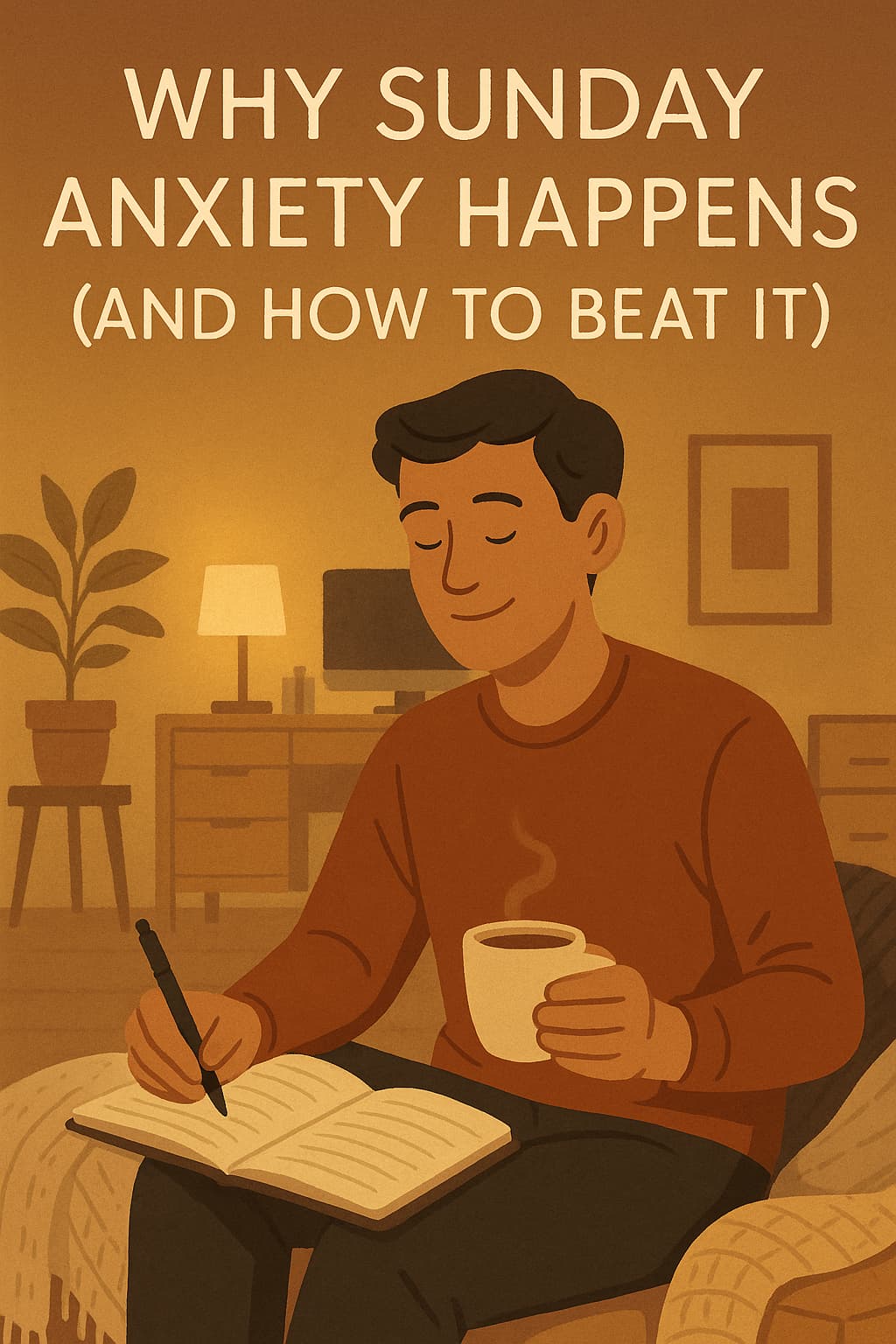Introduction
It’s Sunday evening.
You should be relaxing — but instead, your chest feels tight, your thoughts are racing, and a quiet sense of dread builds as Monday creeps closer.
If you know that feeling, you’re not alone.
Sunday night anxiety before work is real, common, and entirely human. It’s not about being lazy or ungrateful — it’s about how our minds process transition, pressure, and the unknown.
The good news? You can shift it.
With small, intentional steps, you can turn your Sundays into a space of reflection, not worry.
Let’s explore why this happens — and what to do about it.
1. What Is Sunday Anxiety?
Sunday anxiety (often called the "Sunday scaries") is a wave of unease or tension that hits as the weekend winds down.
It can feel like:
-
Dread about the upcoming workweek
-
Racing thoughts at bedtime
-
A heavy or restless feeling
-
Trouble relaxing, even when you want to
It’s your mind reacting to pressure + unknowns: unfinished tasks, upcoming deadlines, or even just the shift from freedom to routine.
2. Why It Happens
Here are a few root causes — and they’re more common than you think:
• Mental overload
You’ve been "on" all week, and now your brain is processing the backlog.
• Lack of closure
Unfinished tasks from the week can linger like background tabs open in your mind.
• Weekend overstimulation
Nonstop scrolling, binge-watching, or socializing can leave your nervous system activated, not rested.
• Sunday structure
Without a rhythm, Sunday can feel aimless — and that invites anxiety to fill the space.
For a deeper look at this topic, check out our full guide on Sunday anxiety here.
3. 5 Gentle Ways to Ease Sunday Night Anxiety
a. Create a Sunday Wind-Down Ritual
Repeatable habits send your brain a message: we’re safe, we’re slowing down.
Try things like:
-
A warm shower + calming music
-
Journaling for 10 minutes
-
Tidying your space slowly and mindfully
b. Plan Monday — But Keep It Light
List just 3 things you need to focus on. That’s it.
Keep it simple to avoid overwhelm.
Bonus: Write your list on paper — it helps move thoughts out of your head.
c. Limit Screen Time After 6 PM
Screens keep your brain overstimulated — especially email, news, and social media.
Try a partial digital detox every Sunday evening. (Not sure how? Here’s a guide →)
d. Move Gently, Don’t Collapse
A walk. A few stretches. Cleaning your kitchen to soft music.
Movement settles your body and helps your thoughts untangle.
e. Make Monday Mornings Lighter
Have something to look forward to:
-
Your favorite coffee
-
A slow start with no meetings before 10
-
A podcast you enjoy on your commute
Future-you will thank present-you.
This also helps ease the emotional tension that builds up as Sunday night work anxiety sets in.
4. How to Handle Sunday Night Anxiety Before Work
If your chest tightens every Sunday evening just thinking about your job — you’re not alone. Sunday night anxiety before work is real. Try giving yourself something light and grounding: lay out your clothes, prep your coffee, or write down one intention for the next day. It’s not about solving Monday — it’s about softening your Sunday.
Mini FAQ
Q: How do I know if it's Sunday anxiety or something bigger?
A: If the dread is constant and severe, talk to someone.
But if it’s mostly Sunday evenings, it’s likely situational — and manageable with routines and awareness.
Q: Does this ever go away completely?
A: It can fade a lot with rhythm, rest, and emotional tools — but it’s okay if it pops up occasionally. You're human.
Conclusion
Sunday night anxiety isn’t weakness — it’s a signal. A sign that your mind needs reassurance, rhythm, and space.
You don’t have to fix it all at once.
Start with one gentle shift — a list, a walk, or a breath. Build from there.
And remember: Mondays are just days. You shape them — not the other way around.
Ready to take control of your mornings too?
Try this 5-minute routine for mental clarity →

